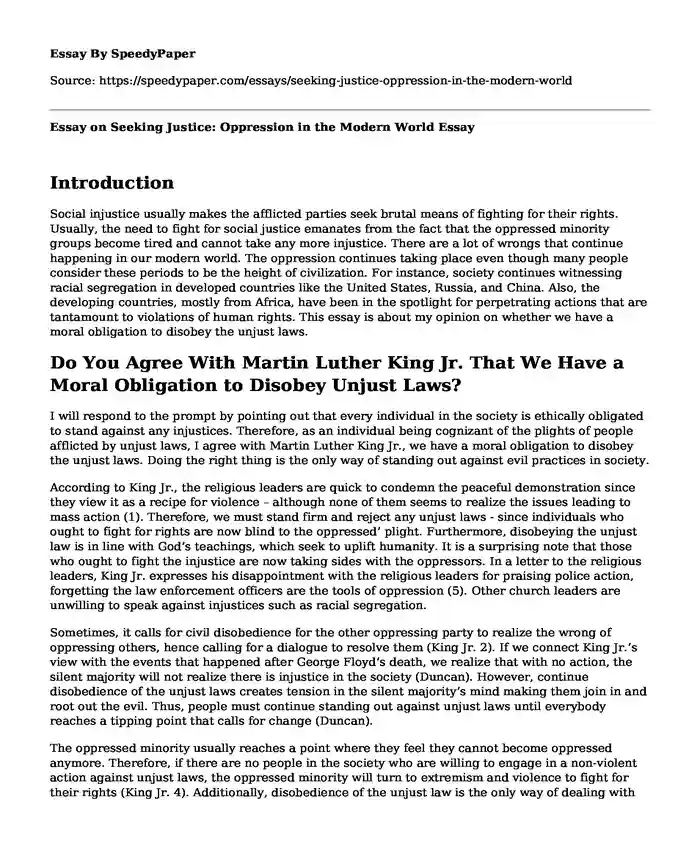
| Type of paper: | Essay |
| Categories: | Justice Social justice Martin Luther King |
| Pages: | 3 |
| Wordcount: | 672 words |
Introduction
Social injustice usually makes the afflicted parties seek brutal means of fighting for their rights. Usually, the need to fight for social justice emanates from the fact that the oppressed minority groups become tired and cannot take any more injustice. There are a lot of wrongs that continue happening in our modern world. The oppression continues taking place even though many people consider these periods to be the height of civilization. For instance, society continues witnessing racial segregation in developed countries like the United States, Russia, and China. Also, the developing countries, mostly from Africa, have been in the spotlight for perpetrating actions that are tantamount to violations of human rights. This essay is about my opinion on whether we have a moral obligation to disobey the unjust laws.
Do You Agree With Martin Luther King Jr. That We Have a Moral Obligation to Disobey Unjust Laws?
I will respond to the prompt by pointing out that every individual in the society is ethically obligated to stand against any injustices. Therefore, as an individual being cognizant of the plights of people afflicted by unjust laws, I agree with Martin Luther King Jr., we have a moral obligation to disobey the unjust laws. Doing the right thing is the only way of standing out against evil practices in society.
According to King Jr., the religious leaders are quick to condemn the peaceful demonstration since they view it as a recipe for violence – although none of them seems to realize the issues leading to mass action (1). Therefore, we must stand firm and reject any unjust laws - since individuals who ought to fight for rights are now blind to the oppressed’ plight. Furthermore, disobeying the unjust law is in line with God’s teachings, which seek to uplift humanity. It is a surprising note that those who ought to fight the injustice are now taking sides with the oppressors. In a letter to the religious leaders, King Jr. expresses his disappointment with the religious leaders for praising police action, forgetting the law enforcement officers are the tools of oppression (5). Other church leaders are unwilling to speak against injustices such as racial segregation.
Sometimes, it calls for civil disobedience for the other oppressing party to realize the wrong of oppressing others, hence calling for a dialogue to resolve them (King Jr. 2). If we connect King Jr.’s view with the events that happened after George Floyd’s death, we realize that with no action, the silent majority will not realize there is injustice in the society (Duncan). However, continue disobedience of the unjust laws creates tension in the silent majority’s mind making them join in and root out the evil. Thus, people must continue standing out against unjust laws until everybody reaches a tipping point that calls for change (Duncan).
The oppressed minority usually reaches a point where they feel they cannot become oppressed anymore. Therefore, if there are no people in the society who are willing to engage in a non-violent action against unjust laws, the oppressed minority will turn to extremism and violence to fight for their rights (King Jr. 4). Additionally, disobedience of the unjust law is the only way of dealing with people who use double stands to apply the set laws since the oppressors will never agree to give everybody equal rights since they are the people who make unjust laws.
Conclusion
In conclusion, all individuals must stand and fight against vices that use unjust law to oppress others since all humans are equal – hence all implemented laws ought to uphold human dignity and apply equally to the majority and minority. Furthermore, the call for disobedience of unjust laws usually challenges the silent minority to seek ways of resolving the said issues.
Works Cited
Duncan, Lauren. “The Psychology of Protest and Activism.” American Psychological Association, 2020. www.apa.org/research/action/speaking-of-psychology/protest-activism
King Jr., Martin Luther. “Negro Is Your Brother.” The Atlantic Monthly, vol. 212, no. 2, Aug. 1963, pp. 78–88.
Cite this page
Essay on Seeking Justice: Oppression in the Modern World. (2023, Oct 13). Retrieved from https://speedypaper.net/essays/seeking-justice-oppression-in-the-modern-world
Request Removal
If you are the original author of this essay and no longer wish to have it published on the SpeedyPaper website, please click below to request its removal:
- Child Welfare or Juvenile Justice? Free Essay Example
- Law Essay Example on Juvenile Justice
- Paper Example - Abolishment of the Death Sentence
- Is Trump the Only One to Blame for the Trade War Between USA and China? Paper Example
- Paper Example. Deterrence Theory in Criminology
- Essay Sample on Elements of Crimes As Proved By the Prosecution
- Community Trust in the Criminal Justice System and Essential Professional Skills - Paper Sample
Popular categories




